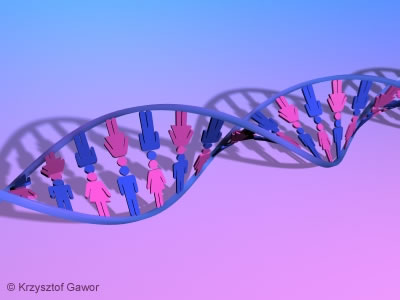Published: December 16, 2009
 Researchers at the Queensland Institute of Medical Research (QIMR), in collaboration with scientists from the University of Edinburgh, have found a new gene that is linked to schizophrenia and bipolar disorder.
Researchers at the Queensland Institute of Medical Research (QIMR), in collaboration with scientists from the University of Edinburgh, have found a new gene that is linked to schizophrenia and bipolar disorder.
The gene, called ABCA13, is active in the hippocampus and cortex regions of the brain and had not previously been associated with mental illness. [continue reading…]
Published: December 16, 2009
 High levels of the hormone leptin, which may help prevent over-eating, is linked to a reduced risk of Alzheimer’s according to a new study published today (Wednesday, 16 December).
High levels of the hormone leptin, which may help prevent over-eating, is linked to a reduced risk of Alzheimer’s according to a new study published today (Wednesday, 16 December).
The research, which appears in the Journal of the American Medical Association, looked at brain scans from 198 older people after measuring their leptin levels. It found a quarter of those with the lowest levels of leptin developed Alzheimer’s compared with six per cent of those with the highest levels.
The JAMA study builds on work that links low leptin levels to the brain plaques found in Alzheimer’s patients.
The hope is leptin could eventually be used as both a marker and a treatment.
Source: Journal of the American Medical Association
Published: December 15, 2009
 Half a million pensioners will spend Christmas Day alone, while nearly three in five people over 55 will be wishing they could see more of their family. At any given time, around one in five Americans – 60 million people – feel so isolated that it makes them seriously unhappy
Half a million pensioners will spend Christmas Day alone, while nearly three in five people over 55 will be wishing they could see more of their family. At any given time, around one in five Americans – 60 million people – feel so isolated that it makes them seriously unhappy
A new book called Loneliness: Human Nature and the Need for Social Connection is co-written by John Cacioppo, a neuroscientist. He says social pain is akin to physical pain. Chronic loneliness can do real physical damage and can lead to increased stress, levels, high blood pressure and disrupted sleep. Link to read the rest of this article by Aditya Chakrabortty in today’s Guardian.
is co-written by John Cacioppo, a neuroscientist. He says social pain is akin to physical pain. Chronic loneliness can do real physical damage and can lead to increased stress, levels, high blood pressure and disrupted sleep. Link to read the rest of this article by Aditya Chakrabortty in today’s Guardian.
You can help – spread a little kindness, bring back a sense of community. If you know someone who lives alone make a point of visiting them, take them a few special treats, better still invite them to eat with you.
Source: The Guardian
Published: December 15, 2009
Volunteer service, such as tutoring children, can help older adults delay or reverse declining brain function, according to a study led by researchers at the Johns Hopkins Bloomberg School of Public Health. Using functional magnetic resonance imaging (fMRI), the researchers found that seniors participating in a youth mentoring program made gains in key brain regions that support cognitive abilities important to planning and organizing one’s daily life. The study is the first of its kind to demonstrate that valuable social service programs, such as Experience Corps—a program designed to both benefit children and older adults’ health—can have the added benefits of improving the cognitive abilities of older adults, enhancing their quality of life. The study is published in the December issue of the Journals of Gerontology: Medical Sciences.
About 78 million Americans were born from 1946 to 1964. Individuals of retirement age are the fastest-growing sector of the U.S. population, so there is great interest in preserving their cognitive and physical abilities, especially given the societal cost of the alternative. [continue reading…]
 Researchers at the Queensland Institute of Medical Research (QIMR), in collaboration with scientists from the University of Edinburgh, have found a new gene that is linked to schizophrenia and bipolar disorder.
Researchers at the Queensland Institute of Medical Research (QIMR), in collaboration with scientists from the University of Edinburgh, have found a new gene that is linked to schizophrenia and bipolar disorder.

